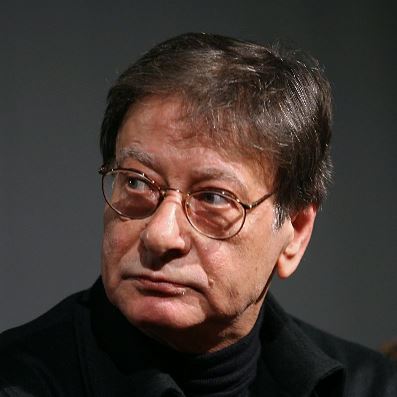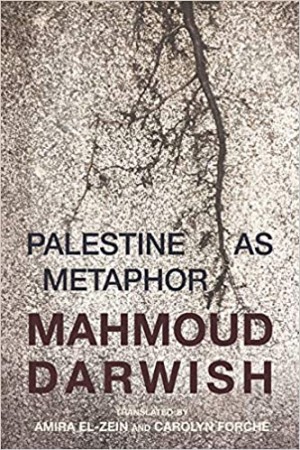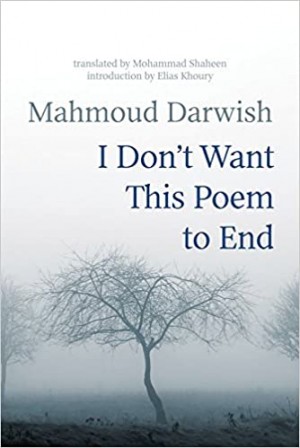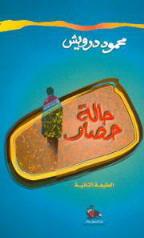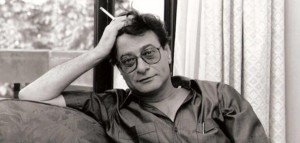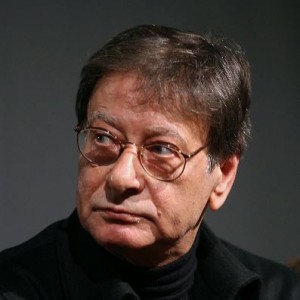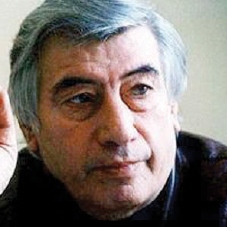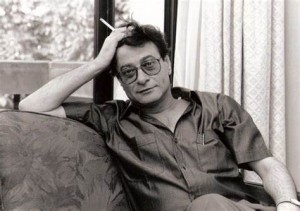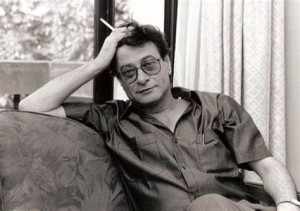13 March 1941 – 9 August 2008
Internationally recognized for his poetry of strong affection for a lost homeland. Darwish has become the main voice for the Palestinian struggle for independence. His poetry is simple in terms of style and vocabulary, but uses everyday words for strong and effective expressions and intense feelings.
A central image to his early poetry has been the resistant hero, who never gives in and keeps up the fight in a struggle for freedom and independence for the Palestinian people.
But with the disappointment he and all other Palestinians experienced from the expulsion of the PLO from Beirut in 1982, his orientation shifted, and became more oriented towards the reality of powerlessness which even the resilient hero can exhibit. What his poetry then reflected was the importance of international politics.
Mahmud Darwish was born into a landowning Sunni Muslim family in the village of Barweh in the Galilee, which was razed to the ground by the Israelis in 1948. Darwish's family were forced to leave their home town after it was declared part of the new state of Israel. In 1949: Darwish' family returned to what now is Israel, settling in the village of Dayru l-Assad.
Early in life, Darwish became politically active through his poetry and involvement in the Israeli Communist Party, Rakah. He spent a period as the editor of Rakah's newspaper, Al-Ittihad (Unity). Darwish's political advocacy brought him a great deal of negative Israeli attention, which included harassment and house arrest. Finally, in 1971, after years of hardship, Darwish left Israel to study for a year in the USSR. Then he went to Egypt where he worked in Cairo for Al-Ahram Newspaper and in Beirut, Lebanon as an editor of the Journal 'Palestinian Issues'. By this time, he had established and upheld an outstanding reputation as one of the leading poets of the resistance. Many of his poems have been converted to music in order to fuel the Palestinian defiance. The Arab population and the international community honor his poetic achievements. Among his accomplishments is the 1969 Lotus Prize , the Ibn Sina Prize in 82 and the Lenin Peace Prize in 83.
In 1987, Darwish was elected to the PLO executive but later in 1993 he resigned in opposition to the Oslo Agreement.
He was also the director of the Palestinian Research Center. He lived in exile between Beirut and Paris until his return in 1996 to Ramallah, Palestine.
His poetry has gained great sophistication over the years, and has enjoyed international fame for a long time. He has published around 30 poetry and prose collections, which have been translated into 35 languages. He is the editor in chief and founder of the prestigious literary review Al Karmel, which has resumed publication in January 1997 out of the Sakakini Centre offices.
He published in 1998 the poetry collection: Sareer el Ghariba (Bed of the Stranger), his first collection of love poems. In 2000 he published Jidariyya (Mural) a book consisting of one poem about his near death experience in 1997. He published his book of poetry "Stage of Siege" in 2002. In 1997 a documentary was produced about him by French TV directed by noted French-Israeli director Simone Bitton. He was a commander of the French Order of Arts and Letters and an honorary member of the Sakakini Centre.
His work:
Poetry
Asafir bila ajniha (Wingless birds), 1960
Awraq Al-Zaytun (Leaves of olives), 1964
Bitaqat huwiyya (Identity Card), 1964
Ashiq min filastin (A lover from Palestine), 1966
Akhir al-layl (The end of the night), 1967
Yawmiyyat jurh filastini (Diary of a Palestinian wound), 1969
Habibati tanhad min nawmiha (My beloved awakens), 1969
al-Kitabah 'ala dhaw'e al-bonduqiyah (Writing in the light of the gun), 1970
al-'Asafir tamut fi al-jalil (Birds are Dying in Galilee), 1970
Mahmoud Darwish works, 1971. Two volumes
Mattar na'em fi kharif ba'eed (Light rain in a distant autumn) 1971
Uhibbuki aw la uhibbuki (I love you, I love you not), 1972
Jondiyyun yahlum bi-al-zanabiq al-baidaa' (A soldier dreaming of white lilies), 1973
Complete Works, 1973. Now al-A'amal al-jadida (2004) and al-A'amal al-oula (2005).
Muhawalah raqm 7 (Attempt number 7), 1974
Tilka suratuha wa-hadha intihar al-ashiq (That's her image, and that's the suicide of her lover), 1975
Ahmad al-za'tar, 1976
A'ras (Weddings), 1977
al-Nasheed al-jasadi (The bodily anthem), 1980. Joint work
The Music of Human Flesh, Heinemann 1980, Poems of the Palestinian struggle selected and translated by Denys Johnson-Davies
Qasidat Bayrut (Ode to Beirut), 1982
Madih al-zill al-'ali (A eulogy for the tall shadow), 1983
Hissar li-mada'eh al-bahr (A siege for the sea eulogies), 1984
Victims of a Map, 1984. Joint work with Samih al-Qasim and Adonis in English.
Sand and Other Poems, 1986
Hiya ughniyah, hiya ughniyah (It's a song, it's a song), 1985
Ward aqal (Fewer roses), 1985
Ma'asat al-narjis, malhat al-fidda (Tragedy of daffodils, comedy of silver), 1989
Ara ma oreed (I see what I want), 1990
Ahad 'asher kaukaban (Eleven planets), 1992
Limaza tarakt al-hissan wahidan (Why Did You Leave the Horse Alone?), 1995. English translation 2006 by Jeffrey Sacks (Archipelago Books) (ISBN 0-9763950-1-0)
Psalms, 1995. A selection from Uhibbuki aw la uhibbuki, translation by Ben Bennani
Sareer El-Ghariba (Bed of a stranger), 1998
Then Palestine, 1999 (with Larry Towell, photographer, and Rene Backmann)
Jidariyya (Mural), 2000
The Adam of Two Edens: Selected Poems, 2000 (Syracuse University Press and Jusoor) (edited by Munir Akash and Carolyn Forche)
Halat Hissar (State of siege), 2002
La ta'tazer 'amma fa'alt (Don't apologize for what you did), 2003
Unfortunately, It Was Paradise: Selected Poems, 2003. Translations by Munir Akash, Caroyln Forché and others
al-A'amal al-jadida (The new works), 2004. A selection of Darwish's recent works
al-A'amal al-oula (The early works), 2005. Three volumes, a selection of Darwish's early works
Ka-zahr el-lawz aw ab'ad (almond blossoms and beyond), 2005
The Butterfly's Burden, 2007 (Copper Canyon Press) (translation by Fady Joudah)
Prose
Shai'on 'an al-wattan (Something about the homeland), 1971
Youmiat muwaten bala watan (Diary of a Citizen without a Country), 1971, translated as The Palestinian Chalk Circle
Wada'an ayatuha al-harb, wada'an ayuha al-salaam (Farewell, war, farewell, peace), 1974
Yawmiyyat al-hozn al-'aadi (Diary of the usual sadness), 1973 (Turkish translation, 2009 by Hakan Özkan)[77]
Dhakirah li-al-nisyan (Memory for Forgetfulness), 1987. English translation 1995 by Ibrahim Muhawi
Fi wasf halatina (Describing our condition), 1987
al-Rasa'il (The Letters), 1990. Joint work with Samih al-Qasim
Aabiroon fi kalamen 'aaber (Bypassers in bypassing words), 1991
Fi hadrat al-ghiyab (In the presence of absence), 2006
Athar alfarasha (A River Dies of Thirst: journals), 2009 (Archipelago Books) (translated by Catherine Cobham)
Darwish's State of Siege was our book club selection for April 2003. More information on the author and his work in Arabic, French and English can be found on the book's page.
